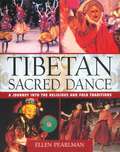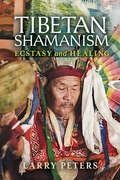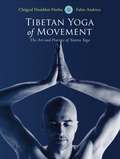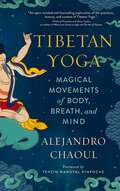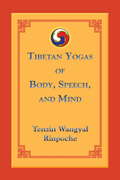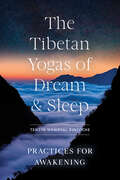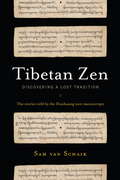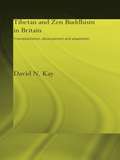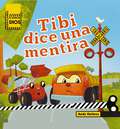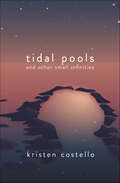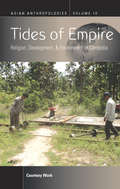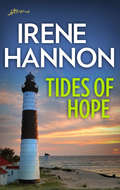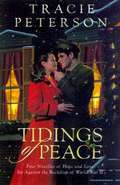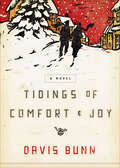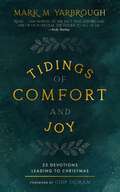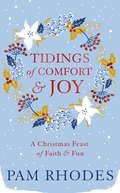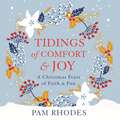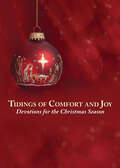- Table View
- List View
Tibetan Sacred Dance: A Journey into the Religious and Folk Traditions
by Ellen PearlmanThe first book to explore the significance and symbolism of the sacred and secular ritual dances of Tibetan Buddhism.• Lavishly illustrated with color and rare historic photographs depicting the dances, costumes, and masks.• Looks at both sacred (cham) and folk (achi lhamo) forms and their role in the development, practice, and culture of Tibetan Buddhism.From the time Buddhism entered the mythical land of the snows, Tibetans have expressed their spiritual devotion and celebrated their culture with dance. Only since the diaspora of the Tibetan people have outsiders witnessed these performances, and when they do, no one explains why these dances exist and what they really mean. Ellen Pearlman, who studied with Lobsang Samten, the ritual dance master of the Dalai Lama's Namgyal monastery in India, set out to discover the meaning behind these practices. She found the story of the indigenous shamanistic Bon religion being superseded by Buddhism--a story full of dangerous and illicit liaisons, brilliant visions, secret teachings, betrayals, and unrevealed yogic practices. Pearlman examines the four lineages that developed sacred cham--the secret ritual dances of Tibet's Buddhist monks--and achi lhamo storytelling folk dance and opera. She describes the mental and physical process of preparing for these dances, the meaning of the iconography of the costumes and masks, the spectrum of accompanying music, and the actual dance steps as recorded in a choreography book dating back to the Fifth Dalai Lama in 1647. Beautiful color photographs from the Tibetan Institute of Performing Arts and Pearlman's own images of touring monastic troupes complement the rare historic black-and-white photos from the collections of Sir Charles Bell, chief of the British Mission in Tibet during the life of the Thirteenth Dalai Lama.
Tibetan Shamanism: Ecstasy and Healing
by Larry PetersReflecting sixteen years of intensive fieldwork, this book is a rich chronicle of the daily lives, belief systems, and healing rituals of four highly revered Tibetan shamans forced into exile by the Chinese invasion during the 1950s. Larry Peters lived and studied closely with the shamans in Nepal, learning their belief system, observing and participating in their rituals, and introducing many dozens of students to their worldview. Including photographs of the shamans in ecstatic ritual and trance, this book--one of the most extensive ethnographic works ever done on Tibetan shamanism--captures the end of Tibetan shamanism while opening a window onto the culture and traditions that survived centuries of attack in Tibet, only to die out in Nepal. The violent treatment of shamans by the Buddhist lama has a long history in Tibet and neighboring Mongolia. At one point, shamans were burned at the stake. However, in the mountainous Himalayan terrain, especially in the difficult to reach areas geographically distant from the Buddhist monastic urban centers, shamans were respected and their work revered. Peters's authoritative and meticulous research into the belief systems of these last surviving representatives of the shamanic traditions of the remote Himalayas preserves, in vivid detail, the techniques of ecstasy, described as pathways to the shamanic spiritual world.From the Trade Paperback edition.
Tibetan Yoga of Movement: The Art and Practice of Yantra Yoga
by Chogyal Namkhai Norbu Paula Barry Naomi Zeitz Fabio AndricoTibetan Yoga of Movement introduces the method of Yantra Yoga, a traditional Tibetan form that is one of the oldest recorded systems of yoga in the world. Derived from an eighth century Tibetan Buddhist text, Yantra Yoga includes many of the same positions found in Hatha Yoga but in Yantra Yoga they are applied differently. The Yantra Yoga system encompasses 108 sets of movements (yantras) and several types of breathing to be learned at one's own pace. Each yantra is a sequence of seven phases of movement connected with seven phases of breathing. With the subtle practice of uniting breathing and movement, Yantra Yoga is an essential practice for yoga practitioners and anyone seeking authentic balance, harmony, and understanding of our true nature.Since the eighth century, this yoga teaching has been passed down from teacher to student in an unbroken lineage. Chogyal Namkhai Norbu, the current lineage holder began transmitting Yantra Yoga in the West in the 1970s. Presenting detailed instructions accompanied by over 400 instructional photos, the book describes the sequence of movements, methods of breathing, and the concrete health benefits of the practice.Table of Contents:What is Yantra Yoga?; The Uniqueness of Yantra Yoga; Advice for Practice; Warm-ups; The Nine Purification Breathings; The Five Exercises for Loosening the Joints; The Eight Movements to Purify the Prana; The Five Exercises to Control the Channels; The Five Main Groups of Yantras: The First Group; The Second Group; The Third Group; The Fourth Group; The Fifth Group; The Vajra Wave to Eliminate ObstaclesFrom the Trade Paperback edition.
Tibetan Yoga: Magical Movements of Body, Breath, and Mind
by Alejandro ChaoulDiscover the hidden tradition of Tibetan yoga, a practice of magical movement for wellness of body, breath, and mind.In Tibetan Yoga, discover ancient Tibetan yogic practices that integrate body, breath, and mind on the journey to personal cultivation and enlightenment. Tibetan Yoga offers accessible instructions for performing the ancient yogic techniques of Tibet&’s Bön religion. This is Tibetan yoga, or trul khor, a deeply authentic yogic practice. Drawing on thirty years of training with Bön&’s most senior masters as well as advanced academic study, Dr. Alejandro Chaoul offers expert guidance on practices that were first developed by Bön masters over a millennium ago, framing them according to the needs of contemporary yoga practitioners and meditators. No matter their level of experience, dedicated practitioners of Tibetan yoga will discover its ability to clear away obstacles and give rise to meditative states of mind. In this book you&’ll learn what it means to practice for the benefit of all beings, and to experience your body as a mandala, from center to periphery. These movements help you live in a more interconnected mind-breath-body experience, with benefits including: - better focus, - stress reduction, - the elimination of intrusive thoughts, - better sleep, - and general well-being.
Tibetan Yogas of Body, Speech, and Mind
by Tenzin WangyalUnderstanding how our actions, words, and thoughts interact enhances our ability to progress in spiritual practice and brings us closer to self-realization. In a warm, informal style Tenzin Wangyal Rinpoche opens up Tibetan meditation practice to both beginners and experienced students, placing as much emphasis on practice as on knowledge. Depending on the sources of the problems in our lives, he offers practices that work with the body, speech, or the mind--a collection of Tibetan yoga exercises, visualizations, sacred sound practices, and spacious meditations on the nature of mind. Together, he says, knowledge and regular meditation practice can alter our self-image and lead to a lighter, more joyful sense of being. The stillness of the body, the silence of speech, and the spacious awareness of mind are the true three doors to enlightenment.
Tibetan Yogas of Dream and Sleep, The: Practices for Awakening
by Tenzin Wangyal RinpocheDeepen your awareness through the practice of Tibetan dream and sleep yoga."If we cannot carry our practice into sleep, if we lose ourselves every night, what chance do we have to be aware when death comes? Look to your experience in dreams to know how you will fare in death. Look to your experience of sleep to discover whether or not you are truly awake."—Tenzin Wangyal Rinpoche We spend a third of our life sleeping and it is common, in many spiritual traditions throughout the world, for the world of dream and sleep to be utilized on the path to awakening. Dream yoga in the Tibetan traditions of dream practice has been the primary support for the realization of many yogis and great Tibetan masters. Now, updated and presented with fresh insight born from years of teaching this practice to Westerners, Tenzin Wangyal clearly presents a powerful method for liberation. With clearly illustrated Tibetan syllables and the places they are to be visualized, this practical guide will be of use to both new and adept practitioners.
Tibetan Zen: Discovering a Lost Tradition
by Sam Van SchaikUntil the early twentieth century, hardly any traces of the Tibetan tradition of Chinese Chan Buddhism, or Zen, remained. Then the discovery of a sealed cave in Dunhuang, full of manuscripts in various languages dating from the first millennium CE, transformed our understanding of early Zen. This book translates some of the earliest surviving Tibetan Zen manuscripts preserved in Dunhuang. The translations illuminate different aspects of the Zen tradition, with brief introductions that not only discuss the roles of ritual, debate, lineage, and meditation in the early Zen tradition but also explain how these texts were embedded in actual practices.
Tibetan and Zen Buddhism in Britain: Transplantation, Development and Adaptation (Routledge Critical Studies in Buddhism)
by David N KayThis book analyses the transplantation, development and adaptation of the two largest Tibetan and Zen Buddhist organizations currently active on the British religious landscape: the New Kadampa Tradition (NKT) and the Order of Buddhist Contemplatives (OBC). The key contributions of recent scholarship are evaluated and organised thematically to provide a framework for analysis, and the history and current landscape of contemporary Tibetan and Zen Buddhist practice in Britain are also mapped out. A number of patterns and processes identified elsewhere are exemplified, although certain assumptions made about the nature of 'British Buddhism' are subjected to critical scrutiny and challenged.
Tibi dice una mentira (Edificando el reino de Dios)
by Andy HolmesEdificando el reino de Dios. Tibi dice una mentira¡Es tiempo de ponerse a trabajar! ¡Los camiones tienen su tarea y están listos para construir! Pero cuando se preparan para dirigirse al lugar de construcción, Tibi dice una mentira. Y la mentira de Tibi le alcanza... ¿Cómo harán sus trabajos y aprenderán sobre por qué Dios dice que es tan importante ser sinceros? Dozer, Diggit, Stretch y Tibi deben usar sus características especiales y trabajar juntos para hacer su trabajo y dar gloria a Dios.A los padres y madres les encantará esta divertida historia que ayuda a los niños a aprender sobre la sinceridad y decir la verdad.Hay pocos libros animados y basados en la fe para varones. Esta nueva marca inspiracional para niños se hace eco de la fuerte tendencia a la construcción, como Where Do Diggers Sleep At Night? y Goodnight, Goodnight, Construction Site. La construcción y los camiones son siempre temas interesantes para los niños, haciendo de estos libros destacados títulos por sí solos.Andy Holmes es un autor de best sellers infantiles, con más de 500.000 libros vendidos.
Tickled Pink
by Debby MaynePriscilla Slater shows up at her 20-year reunion as a national celebrity. Her hair salon dynasty has skyrocketed, and to top it off, she has her own line of hair products. She has become a huge success with the "Ms. Prissy Big Hair" line that lets women with the thinnest of locks get the coveted "big hair" look so popular in the South. Her classmates have finally come to terms with adulthood, but they're handling it with the grace of a Southern woman wearing white after Labor Day. It's just downright awkward! Asserting the maturity that her classmates have often lacked, Priscilla holds her head high. But she can't ignore everything. When she catches her mother in the arms of her former high school principal, Priscilla can't get out of town fast enough. Eager to get back to her more comfortable life, Priscilla runs head on into an ultimatum: Tim tells her they're not getting any younger--as if she has to be reminded.
Tickled Pink
by Debby MaynePriscilla Slater shows up at her 20-year reunion as a national celebrity. Her hair salon dynasty has skyrocketed, and to top it off, she has her own line of hair products. She has become a huge success with the "Ms. Prissy Big Hair" line that lets women with the thinnest of locks get the coveted "big hair" look so popular in the South. Her classmates have finally come to terms with adulthood, but they're handling it with the grace of a Southern woman wearing white after Labor Day. It's just downright awkward! Asserting the maturity that her classmates have often lacked, Priscilla holds her head high. But she can't ignore everything. When she catches her mother in the arms of her former high school principal, Priscilla can't get out of town fast enough. Eager to get back to her more comfortable life, Priscilla runs head on into an ultimatum: Tim tells her they're not getting any younger--as if she has to be reminded.
Tidal Pools and Other Small Infinities
by Kristen Costello"You'll walk away with more gratitude for the slow burn of the healing process." ó Alicia Cook, author of Sorry I Havenít Texted You BackTidal Pools and Other Small Infinities blurs the lines between endings and beginnings. The love story starts in the usual way: a whirlwind of confessions, late night conversations, and promises that seem sturdy. The years pass by, and novelty is replaced by a comforting routine ñ one thatís difficult to walk away from when things take a toxic turn. This is a collection about bravery and evolution. It takes courage to leave behind the familiar. To question all the things that once seemed undeniably true. To learn to stand on your own and, in doing so, become who you were really meant to be. Endings can be the best beginningsÖonce you realize you have the power to create them.
Tides of Empire: Religion, Development, and Environment in Cambodia (Asian Anthropologies #10)
by Courtney WorkAt the forested edge of Cambodia’s development frontier, the infrastructures of global development engulf the land and existing social practices like an incoming tide. Cambodia’s distinctive history of imperial surge and rupture makes it easier to see the remains of earlier tides, which are embedded in the physical landscape, and also floating about in the solidifying boundaries of religious, economic, and political classifications. Using stories from the hybrid population of settler-farmers, loggers, and soldiers, all cutting new social realities from the water and the land, this book illuminates the contradictions and continuities in what the author suggests is the final tide of empire.
Tides of Hope
by Irene HannonHe's an officer...but is he a gentleman?Not if you ask feisty single mom Kate MacDonald! Everything about Lieutenant Craig Cole, Nantucket's new Coast Guard commander, rubs her the wrong way. Worse, everyone else is smitten with the man-including Kate's four-year-old daughter. Local gossip reveals that Craig has saved many in the line of duty. He's a true hero. Kate doesn't want to like him-shecertainlydoesn't want to love him-but Craig's quiet honor could win her heart after all.
Tides of Hope
by Irene HannonHe’s An Officer...But Is He A Gentleman?Not if you ask feisty single mom Kate MacDonald! Everything about Lieutenant Craig Cole, Nantucket’s new Coast Guard commander, rubs her the wrong way. Worse, everyone else is smitten with the man—including Kate’s four-year-old daughter. Local gossip reveals that Craig has saved many in the line of duty. He’s a true hero. Kate doesn’t want to like him—she certainly doesn’t want to love him—but Craig’s quiet honor could win her heart after allOriginally published in 2009
Tidewater Inn: A Hope Beach Novel (The Hope Beach Series #1)
by Colleen CobleWelcome to Hope Beach. A place of intoxicating beauty . . . where trouble hits with the force of a hurricane.Inheriting a beautiful old hotel on the Outer Banks could be a dream come true for Libby. The inn cries out for her restorer's talent and love of history. She's delighted to learn of the family she never knew she had. And the handsome Coast Guard lieutenant she's met there on the island could definitely be the man of her dreams.But Libby soon realizes that the only way she can afford the upkeep on the inn is to sell it to developers who are stalking the island. The father who willed her the inn has died before she could meet him, and her newfound brother and sister are convinced she's there to steal their birthright. Worst of all, her best friend and business partner has been kidnapped before her eyes, and Libby's under suspicion for the crime.Libby's dream come true is becoming a nightmare. Her only option is to find her friend and prove her innocence, or lose everything on the shores of Hope Island.
Tidings Of Comfort And Joy
by T. Davis BunnIn this novel of Christmas past and present, 14 year old Marissa, too ill to rise from her bed, feels helpless rage because she must stay with Gran while her family goes to Hawaii for the holidays. Gran, mourning the recent death of her husband, confides an unhappy Christmas she experienced over a half century ago in a hospital in England where she suffered from pneumonia and abandonment by her fiancé. Marissa matures and grows close to her grandmother as she hears Gran's story of how she learned to forgive and embrace the unexpected opportunities God places in her path. Along with a kindly landlady, an overworked pastor, stranded American soldiers and an entire village, she draws upon newfound inner resources of ingenuity, determination and compassion as she joins the struggle to rescue over 300 war orphans. A vivid description of post World War II Britain, and triumph over personal loss, this story will warm your heart and. enhance your spiritual celebration of Christmas.
Tidings Of Peace
by Tracie PetersonComing Home David receives a hero's welcome from the family of a friend lost at Pearl Harbor. Hope and truth abound in their home and in the eyes of a young woman who sees only a hero in need of grace. Remember Me Stationed in the dangerous South Pacific, Erik Anderson fears the fiancee he left behind may have found someone new. Can a childhood dth--and a long-sought love-be renewed when his very survival is at stake? Shadow of His Wings While her husband, Collin, battles in the air over Europe, Melody Thompson must welcome their child into the world on her own. Scorned by her family, Melody longs to find forgiveness and face the future before her.... Parachutes and Lace Clara Campbell is thrilled to be working with the Red Cross in England until she discovers that her beloved Michael is to be shipped out within hours. With images of a "proper wedding" dancing through her head, will Clara's dreams disguise what matters most?
Tidings of Comfort & Joy: A Novel
by Davis BunnIn this heartwarming Christmas novella. a woman tells her sick granddaughter a riveting tale of love, loss, and heroism set in a war-torn English village.Christmas should be a joyous time. But this year young Marissa’s celebration is overshadowed in sickness, sorrow, and disappointment. Seeing her granddaughter struggle with pain and sadness, Emily decides to share a story that she’s never told anyone. As old memories live again through her words, two broken hearts find healing and comfort—and the courage to celebrate Christmas once again.Tidings of Comfort & Joy reminds us to share the bonds of faith and family that Christmas represents whatever the circumstances or season.“This little novella has it all: romance, homeless orphans, heroic American pilots, the delightfully intriguing backdrop of post-war England, and Bunn’s competent, smooth writing. The happy ending will warm the heart of even the most jaded reader. What’s not to like?” —Bookreporter.com
Tidings of Comfort and Joy: 25 Advent Devotionals Leading to Christmas
by Mark. M YarbroughRemember Christ our Savior was born on Christmas Day. The Christmas season easily overwhelms, and meaning can be lost in the busyness. In Tidings of Comfort and Joy, Mark M. Yarbrough reminds us why we celebrate. These twenty--five short devotions focus December on Jesus through a combination of Scripture reflections, winsome stories, advent applications, and guided prayers. This is a book that you and your family will turn to annually, as you prepare your heart for the wonder and meaning of Christmas.
Tidings of Comfort and Joy: A Christmas Feast of Faith and Fun
by Pam RhodesPam Rhodes is best known as the familiar face of the BBC's Songs of Praise, and here she brings together her personal selection of carols, poems, Bible readings and other inspirational passages from a wide range of sources.As well as the usual old favourites - from Hark the Herald Angels Sing to the stories of the shepherds and the wise men visiting the baby Jesus - there are plenty of lighter moments, with excerpts from Gervase Phinn's memoirs and funny poems by modern writers. Alongside the items themselves Pam shares some of her own Christmas reminiscences and explores the resonance of the Christmas story for all our lives in her trademark inviting and heartwarming style.There is something here for everyone, from those wanting to enjoy dipping in for a taste of Christmas to those needing a sourcebook to inspire selections for Christmas services. Enjoy!
Tidings of Comfort and Joy: A Christmas Feast of Faith and Fun
by Pam RhodesPam Rhodes is best known as the familiar face of the BBC's Songs of Praise, and here she brings together her personal selection of carols, poems, Bible readings and other inspirational passages from a wide range of sources.As well as the usual old favourites - from Hark the Herald Angels Sing to the stories of the shepherds and the wise men visiting the baby Jesus - there are plenty of lighter moments, with excerpts from Gervase Phinn's memoirs and funny poems by modern writers. Alongside the items themselves Pam shares some of her own Christmas reminiscences and explores the resonance of the Christmas story for all our lives in her trademark inviting and heartwarming style.There is something here for everyone, from those wanting to enjoy dipping in for a taste of Christmas to those needing a sourcebook to inspire selections for Christmas services. Enjoy!
Tidings of Comfort and Joy: A Christmas Feast of Faith and Fun
by Pam RhodesPam Rhodes is best known as the familiar face of the BBC's Songs of Praise, and here she brings together her personal selection of carols, poems, Bible readings and other inspirational passages from a wide range of sources.As well as the usual old favourites - from Hark the Herald Angels Sing to the stories of the shepherds and the wise men visiting the baby Jesus - there are plenty of lighter moments, with excerpts from Gervase Phinn's memoirs and funny poems by modern writers. Alongside the items themselves Pam shares some of her own Christmas reminiscences and explores the resonance of the Christmas story for all our lives in her trademark inviting and heartwarming style.There is something here for everyone, from those wanting to enjoy dipping in for a taste of Christmas to those needing a sourcebook to inspire selections for Christmas services. Enjoy!(P)2015 Hodder & Stoughton
Tidings of Comfort and Joy: Devotions for the Christmas Season
by Curtis A JahnI bring you good tidings of great joy…Christmas is often a hectic time of year, which can make it difficult to enjoy the festivities or even cause you to lose sight of the real reason for the season and the true meaning of Christmas.Tidings of Comfort and Joy is an uplifting devotional that will help you stay grounded on what’s really important at Christmastime. In this book, you’ll discover God’s biblical promises of the coming Messiah: Jesus, his own Son.As you read these devotions, you’ll feel the perfect comfort and encouragement that only the Good News of Christ’s birth can provide!
Tidings of Great Boys (All About Us #5)
by Shelley AdinaFinals week is approaching and Mac is still undecided on where to spend the holidays. Normally she'd go home to Scotland, but spending two weeks alone in the castle with her dad isn't as appealing as it used to be. So she invites Carly, Lissa, Gillian, and Shani to join her for the holidays! Mac is determined to make this the best Christmas ever. She even decides to organize the traditional Hogmany dance for New Year's Eve. If she can get her mother involved in the dance, maybe her parents will finally get back together. But when Mac and the girls arrive in Scotland, they are faced with bad news: the castle is falling apart and Mac's parents are struggling financially. Not only that, but Shani is in big trouble with Prince Rashid's royal family. Can the girls find a way to celebrate the holidays, get Mac's parents back together, save the castle, and rescue Shani from her relentless pursuers? There's only one way to find out ...
